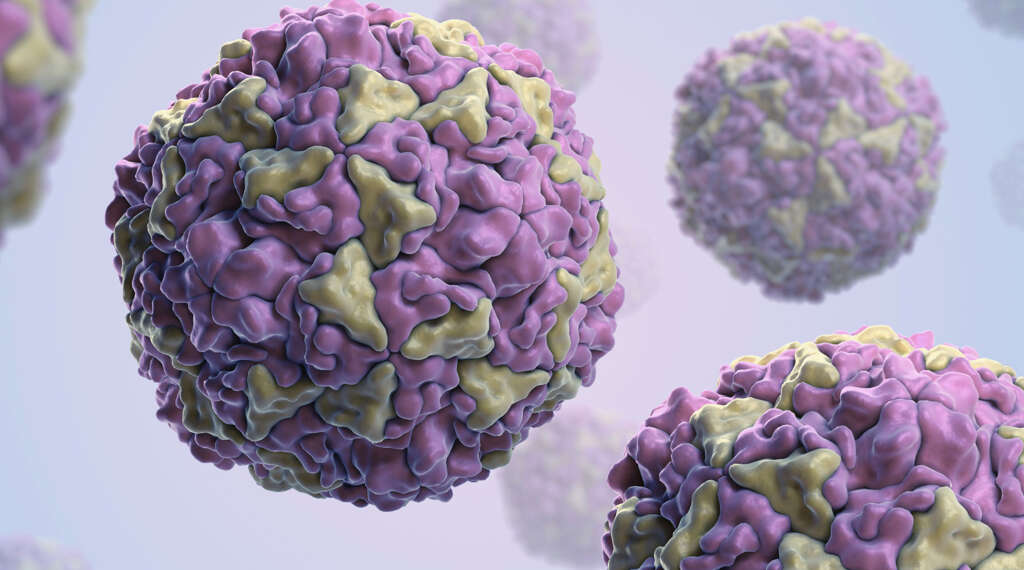What Is Viral Meningitis?
 Article Sources
Article Sources
- 1. “Viral Meningitis, the Facts.” Meningitis Now, July 2020, Viral_meningitis_fact_sheet_july 2020.pdf, meningitisnow.org
- 2. “Viral Meningitis.” Logan, S. A., & MacMahon, E. (2008). BMJ (Clinical research ed.), 336(7634), 36–40. https://doi.org/10.1136/bmj.39409.673657.AE
- 3. “Viral Meningitis.” Centers for Disease Control and Prevention, Centers for Disease Control and Prevention, www.cdc.gov/meningitis/viral.html
Although many people respond with feelings of alarm or dread when they hear about meningitis, there is a big difference between the two main types of this disease. The rare bacterial meningitis can be severely damaging or even deadly. Viral meningitis, however, is more common and can even occur without people knowing they have anything more than the flu.
Because the early symptoms of these two kinds of meningitis are very similar, bacterial meningitis needs to be ruled out immediately by a medical professional. Even though it usually resolves with no treatment, viral meningitis should also be taken seriously, as it can cause painful and difficult symptoms that occasionally leave patients with life-changing repercussions.

1. What Is Viral Meningitis?
Viral meningitis occurs when the membranes surrounding the spinal cord and brain, known as the meninges, become inflamed.1“Viral Meningitis, the Facts.” Meningitis Now, July 2020, Viral_meningitis_fact_sheet_july 2020.pdf, meningitisnow.org The meninges function as a cushion between the spinal cord and the spine. They offer the same protection between the brain and the skull. These membranes also transport cerebrospinal fluid.
Inflammation can occur when one of a number of usually harmless viruses, including the common cold, reaches the meninges. The exact virus that initiates the inflammation is often unknown. The swelling of the membranes in response to the inflammation may trigger headaches, fever, and other symptoms.

2. What Causes Viral Meningitis?
Enteroviruses, which live in the intestines, commonly cause colds, upset stomachs, and other mild illnesses. These viruses are also the most common cause of viral meningitis in people of all ages. Most people who deal with an illness caused by an enterovirus never develop meningitis.
Mumps, measles, chickenpox, HIV, and Epstein-Barr virus are some of the other viruses that can cause viral meningitis. When the inflammation appears in newborns, it can sometimes be traced to a perinatal infection.2“Viral Meningitis.” Logan, S. A., & MacMahon, E. (2008). BMJ (Clinical research ed.), 336(7634), 36–40. https://doi.org/10.1136/bmj.39409.673657.AE Rarely, however, do any of these viruses spread to the meninges and cause inflammation.

3. Who Is at Risk for Viral Meningitis?
Infants are more vulnerable to an acute case of the disease. The chance of an individual becoming infected with viral meningitis decreases as a person ages.3“Viral Meningitis.” Centers for Disease Control and Prevention, Centers for Disease Control and Prevention, www.cdc.gov/meningitis/viral.html As with most viruses, those with weakened immune systems are at a greater risk of developing viral meningitis. It is also more likely to be severe if the immune system is compromised.
Because young children and infants are most susceptible to enteroviruses, children under the age of four contract viral meningitis most often. Enteroviruses tend to occur most often in the late summer and fall, so the rate of viral meningitis also goes up during those seasons. In tropical climates, the rate of both remains fairly constant all year.

4. How Does Viral Meningitis Spread?
Close contact with a person who has viral meningitis may spread the virus that initially caused the meningitis. That does not spread meningitis, however, as only a very small number of people who get that virus will ever develop viral meningitis.3“Viral Meningitis.” Centers for Disease Control and Prevention, Centers for Disease Control and Prevention, www.cdc.gov/meningitis/viral.html
Viral meningitis itself is not considered to be contagious. Contact with an infected person does not increase the risk of developing inflammation. It is rare to find any linked cases that indicate the disease spread through contact between individuals.1“Viral Meningitis, the Facts.” Meningitis Now, July 2020, Viral_meningitis_fact_sheet_july 2020.pdf, meningitisnow.org

5. What Are the Symptoms of Viral Meningitis?
Viral meningitis often goes unreported because most people who contract it don’t know they have it. Although reactions to the inflammation can vary, the classic symptoms of viral meningitis in children and adults are fever, headache, neck stiffness, and light sensitivity.2“Viral Meningitis.” Logan, S. A., & MacMahon, E. (2008). BMJ (Clinical research ed.), 336(7634), 36–40. https://doi.org/10.1136/bmj.39409.673657.AE Other symptoms may include rash, sore throat, lethargy, sleepiness, nausea, vomiting, loss of appetite, and irritability.
Age may also impact symptoms. Adults may not experience neck stiffness or light sensitivity.2“Viral Meningitis.” Logan, S. A., & MacMahon, E. (2008). BMJ (Clinical research ed.), 336(7634), 36–40. https://doi.org/10.1136/bmj.39409.673657.AE In young children, sometimes the only symptoms are fever and irritability. Infants may experience lethargy, sleepiness, irritability, fever, and poor eating.3“Viral Meningitis.” Centers for Disease Control and Prevention, Centers for Disease Control and Prevention, www.cdc.gov/meningitis/viral.html Fatigue and weakness often accompany this infection, as well.

6. How Long Does Viral Meningitis Last?
Although symptoms of chronic meningitis can last for years, people who respond to viral meningitis with normal immune systems usually get better on their own within seven to ten days.3“Viral Meningitis.” Centers for Disease Control and Prevention, Centers for Disease Control and Prevention, www.cdc.gov/meningitis/viral.html Infants and people with weakened immune systems may recover more slowly.
Although it is rare for anyone to have viral meningitis more than once, it could happen. Most people develop some immunity to the virus that initially caused the meningitis, but because many different kinds of viruses can initiate the inflammation, it is possible to develop this type of meningitis a second time.

7. How Is Viral Meningitis Diagnosed?
Because early symptoms can easily be confused with bacterial meningitis, a diagnosis is very important. Bacterial meningitis is a very serious infection that can cause hearing loss, brain damage, and death. With viral meningitis, an associated infection of encephalitis is possible and can increase the danger of complications.
A blood test, nose or throat swab, or stool sample may be used for diagnosis by a medical professional. Another method is to draw fluid from around the spinal cord.3“Viral Meningitis.” Centers for Disease Control and Prevention, Centers for Disease Control and Prevention, www.cdc.gov/meningitis/viral.html For a definitive diagnosis of viral meningitis, as well as the ability to identify the cause of the disease, some professionals prefer to use the sample of cerebrospinal fluid from the draw.2“Viral Meningitis.” Logan, S. A., & MacMahon, E. (2008). BMJ (Clinical research ed.), 336(7634), 36–40. https://doi.org/10.1136/bmj.39409.673657.AE

8. How Is Viral Meningitis Treated?
Most people recover without treatment at home. Although some people may take antivirals if their meningitis is caused by influenza or the herpes virus, it is important to note that antibiotics are not effective on viral infections. Hospitalization may be necessary if the infection becomes severe.3“Viral Meningitis.” Centers for Disease Control and Prevention, Centers for Disease Control and Prevention, www.cdc.gov/meningitis/viral.html
There is no specific treatment protocol, but rest is important for recovery to be complete. Close attention should be paid to keeping the patient hydrated, and painkillers can be taken if needed.1“Viral Meningitis, the Facts.” Meningitis Now, July 2020, Viral_meningitis_fact_sheet_july 2020.pdf, meningitisnow.org Anti-nausea medication may also be helpful for controlling vomiting.

9. How Long Does Viral Meningitis Last?
Viral meningitis usually improves on its own without any serious problems. Most people feel completely normal well within two weeks. Occasionally recovery can be slow, however, and the after-effects can be debilitating.
Serious lingering problems can include memory loss, extreme fatigue, and ongoing headaches. In addition, anxiety, depression, and dizziness can remain after the infection has subsided. Hearing problems and difficulty with balance have also been reported.1“Viral Meningitis, the Facts.” Meningitis Now, July 2020, Viral_meningitis_fact_sheet_july 2020.pdf, meningitisnow.org

10. How Is Viral Meningitis Prevented?
Preventing the viruses which may initiate viral meningitis includes good cleaning and sanitation habits. Wash hands thoroughly after using the toilet, and avoid close contact with sick people. Those who are ill should stay home and away from other people.3“Viral Meningitis.” Centers for Disease Control and Prevention, Centers for Disease Control and Prevention, www.cdc.gov/meningitis/viral.html
Avoiding rodents and mosquito bites also help prevent viruses. By preventing those viruses which can trigger viral meningitis, there is less chance of developing the inflammation itself. A good diet and exercise can help keep an immune system healthy and ready to defend against any illness.









